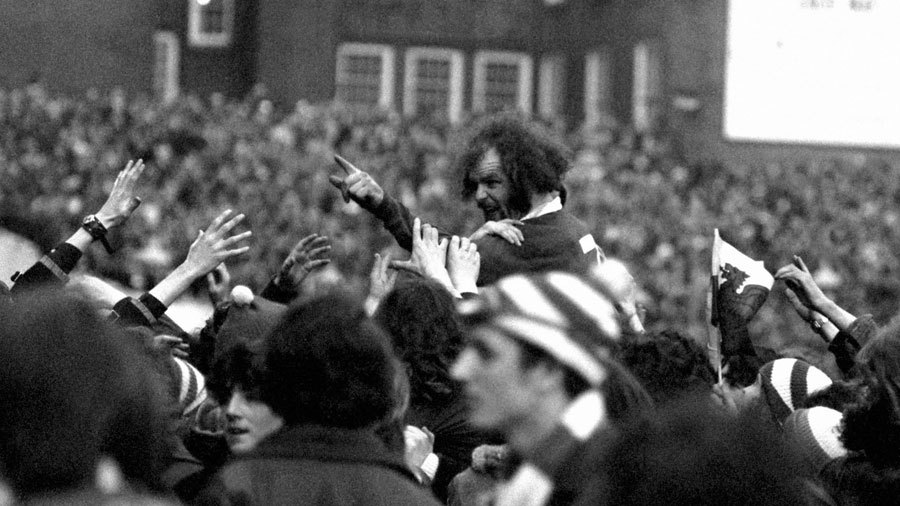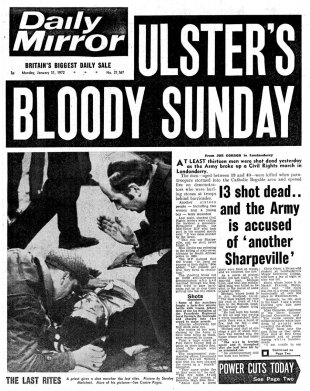|
Ireland v Wales 1972
The Grand Slam that never was
John Taylor
February 25, 2014

John Taylor is carried off after Wales' 35-12 defeat of Scotland in Cardiff ... but violence in Ireland put paid to a bid for a second Grand Slam © PA Photos
Enlarge
We have only played three rounds of the Six Nations but, once again, the top four countries are so evenly matched there will be no Grand Slam in 2014. They are often predicted but seldom happen - 37 in total over the hundred years or so since France joined the Championship in 1908 to make it possible. That unpredictability is one of the things that makes the Six Nations such a wonderful tournament and it has always been so. England have managed 12 Grand Slams, Wales are one behind, France have 9 and Scotland and Ireland just 3 and 2 respectively. In the modern era France have actually the most impressive record as they did not win their first Slam until 1968. Every Grand Slam is special but winning them back to back is very, very rare. Wales achieved it in 1908 and '09 but that was when France had only just started playing internationally and were easy meat (they did not win their first international match until 1911). England also did it in 1913 and '14 but France were still whipping boys. In the modern era it has only been done on two occasions.

Bloody Sunday was followed by attacks against the British Embassy in Dublin
© Scrum.com
Enlarge
Will Carling's England achieved it in 1991 and '92 and France emulated them in 1997 and '98. Wales never achieved it in the 70s but we had a chance in 1971 and '72 only to have it snatched away by the IRA! Having carried all before us in 1971 and, with the likes of Gareth Edwards, Barry John, JPR Williams, Gerald Davies and Mervyn Davies at the peak of their powers, we were pretty confident we could do it again. It all appeared to be falling into place. A 12-3 routine win at Twickenham was followed by a 35-12, five try hammering of Scotland in Cardiff on February 5. History beckoned. We shall never know. This was at the height of the Irish troubles and a few days earlier the British Embassy in Dublin had been burned down following Bloody Sunday in Londonderry. The Ireland v Scotland game, due to be played just two weeks later, was called off almost immediately and we were scheduled to play in Dublin on March 11. Most of us were in favour of going until the Cardiff contingent - Gerald Davies, Gareth, Barry and John Bevan - received threatening letters purporting to be from the IRA. That changed everything and the WRU general committee called for our match to be called off as well. I had had some misgivings but, partly because Ireland have always fielded a team made up of players from north and south and was seen as a unifying force, I could not see us being targeted so was happy to go. The very least I hoped for was a postponement - until the start of the following season if necessary - but as it became clear that was not on the agenda I remember feeling considerable anger along with the huge disappointment of missing an international match - we only played three that season. The Irish board desperately wanted the match to go ahead and at the time I felt we let them down but, in retrospect, I suppose it would have been foolish to risk lives for a game of rugby. I guess I hated the thought of caving in to the IRA. What made it all the more frustrating was that it should have been the key match in a great Five Nations Championship. Ireland had beaten France and England in their two away matches and were very strong with the likes of Mike Gibson, Willie John McBride, my great rival Fergus Slattery, Ray McLoughlin and Sean Lynch who had all been on the Lions Tour to New Zealand with us just a few months before. I have no doubt they would have seen off Scotland at home and we went on to beat France comfortably, extending our Five Nations winning run to eight, so everything was set-up perfectly but it never happened.
The irony was that Old Belvedere, one of the senior Dublin Clubs, held an International Sevens Tournament that year, so a couple of months later I went as part of a London Welsh team containing half a dozen internationals. We received a truly amazing welcome and we won the tournament so I did get a victory in Dublin that year - just not the one I craved. Bloody Sunday was appalling but everything soon returned to normal in the South and England duly fulfilled their fixture in Dublin the following season. They lost 18-9 setting-up the line from England captain, John Pullin, that has now become a part of rugby folklore - "We may not be very good but at least we turn-up." We shall never know whether we were good enough for that elusive back to back Grand Slam. © ESPN Sports Media Ltd John Taylor is a former Wales international who toured with the British & Irish Lions in 1968 and 1971. Since retiring he has worked in the media and has covered the last eight Lions tours as a commentator or journalist
| |||||||||||||||
Live Sports
Communication error please reload the page.
-
Football
-
Cricket
-
Rugby
-
- Days
- Hrs
- Mins
- Secs
F1 - Abu Dhabi GP
Abu Dhabi Grand Prix December 11-131. Max Verstappen ()
2. Valtteri Bottas (Mercedes)
3. Lewis Hamilton (Mercedes)
4. Alexander Albon ()
5. Lando Norris ()
6. Carlos Sainz Jr ()
-
ESPNOtherLive >>
Boxing - Nelson v Wilson; Simmons v Dickinson; Joshua v Gavern (Metro Radio Arena, Newcastle)
Golf - Houston Open
Snooker - China Open
Tennis - Miami Open

